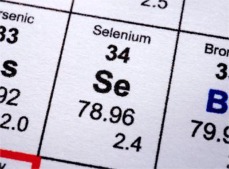Selenium (Se)

A rare element in the Earth's crust, discovered in 1817 and originally noted only for its toxicity, selenium is now known to be essential in small quantities for all higher animals and to have powerful antioxidant properties. In livestock, along with iodine and zinc it protects against infertility, metabolic disorders and mastitis. In humans it protects against infertility, chronic ailments, certain types of cancer and is now thought to help prevent HIV from developing into full-blown AIDS.
For many years, despite its known essentiality for humans, it was not thought to have any role in plant growth and development. We now know that in excess it can actually reduce growth, flowering and yields of many crops, but at lower concentrations it may prevent disease, probably due to its antioxidant properties. In potato crops it regulates nitrate levels in tubers and reduces the formation of glycoalkaloids.
More research is necessary to reveal further properties of this interesting element and to establish the daily human requirement. At present, the government's RDA has been set at just 55 micrograms per day. Experts in the field regard this figure as inadequate by a wide margin.
Selenium Deficiency Symptoms in Livestock
Higher incidence of disease
Low conception rates
Abortion and miscarriage
Neo-natal death
Mal-presentations
Thick amniotic sac (risk of suffocation at birth)
Retained afterbirths
Prolapse
Bent-over front hooves at birth
High incidence of pneumonia
High incidence of scouring
High incidence of mastitis
White muscle disease
